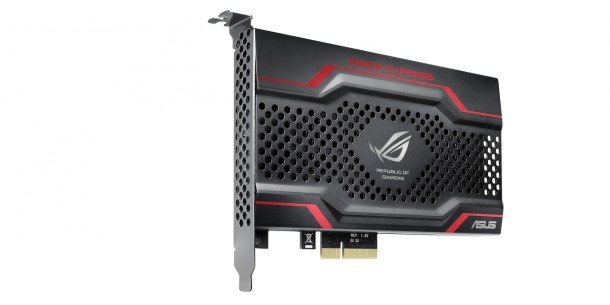Asus SSD announced with RAIDR high-speed PCIe interface

Taiwanese manufacturing mogul, Asus, are aiming their Republic of Gamers sub-brand squarely at the performance SSD arena by announcing its very own PCI-Express solid state drive.
Well, it's kind of a pre-announcement actually as they're still not releasing any real details as to what actually the Asus RoG RAIDR Express is going to be, or what is going to be sitting behind that black and red EMI shielding. I spoke to Asus just after the reveal and was told the spec is currently confidential and still subject to further optimisation.
What we do know though is that as a PCIe-based SSD it's going to be capable of better peak read/write speeds than the current line of SATA 6Gbps 2.5-inch SSDs, thanks to the increased bandwidth offered by the PCIe lanes.
The top SSDs are already bumping up against the limits of the SATA 6Gbps interface, so if you want to push past that these PCIe drives are the way forward. Well, until the hybrid SATA Express interface sees the light of day anyways.
I've already checked out other PCIe drives and I'd expect the RAIDR Express to be built along the same lines; with a set of mSATA SSDs plugged into the board in a RAID array. Hence the name.
I'm guessing Asus will be using straight off-the-shelf parts for this, so I'd expect to see the ubiquitous SandForce SF-2281 controllers running things on the board, rather than the newer memory controllers from the likes of Marvell, Samsung or OCZ/Indilinx.
Sadly, while the peak numbers I've seen from other PCIe SSDs have been impressive - with the older 3Gbps SandForce controllers I've wrung 2GB/s read and write speeds from a PCIe drive - the actual real-world performance doesn't quite match up. ZIP file decompression and large file transfers can all be relatively slow, with 4K random read/write speeds (indicative of general Windows performance) being no better than a single SandForce SSD.
The biggest gaming news, reviews and hardware deals
Keep up to date with the most important stories and the best deals, as picked by the PC Gamer team.
Fingers crossed though Asus will be able to make some improvements to its drives in their labs once it is finished with the optimisation it needs to do. Hopefully then the RAIDR Express will be capable of some frightening feats of storage performance.
We'll know for sure once the drives land in early April.

Dave has been gaming since the days of Zaxxon and Lady Bug on the Colecovision, and code books for the Commodore Vic 20 (Death Race 2000!). He built his first gaming PC at the tender age of 16, and finally finished bug-fixing the Cyrix-based system around a year later. When he dropped it out of the window. He first started writing for Official PlayStation Magazine and Xbox World many decades ago, then moved onto PC Format full-time, then PC Gamer, TechRadar, and T3 among others. Now he's back, writing about the nightmarish graphics card market, CPUs with more cores than sense, gaming laptops hotter than the sun, and SSDs more capacious than a Cybertruck.

